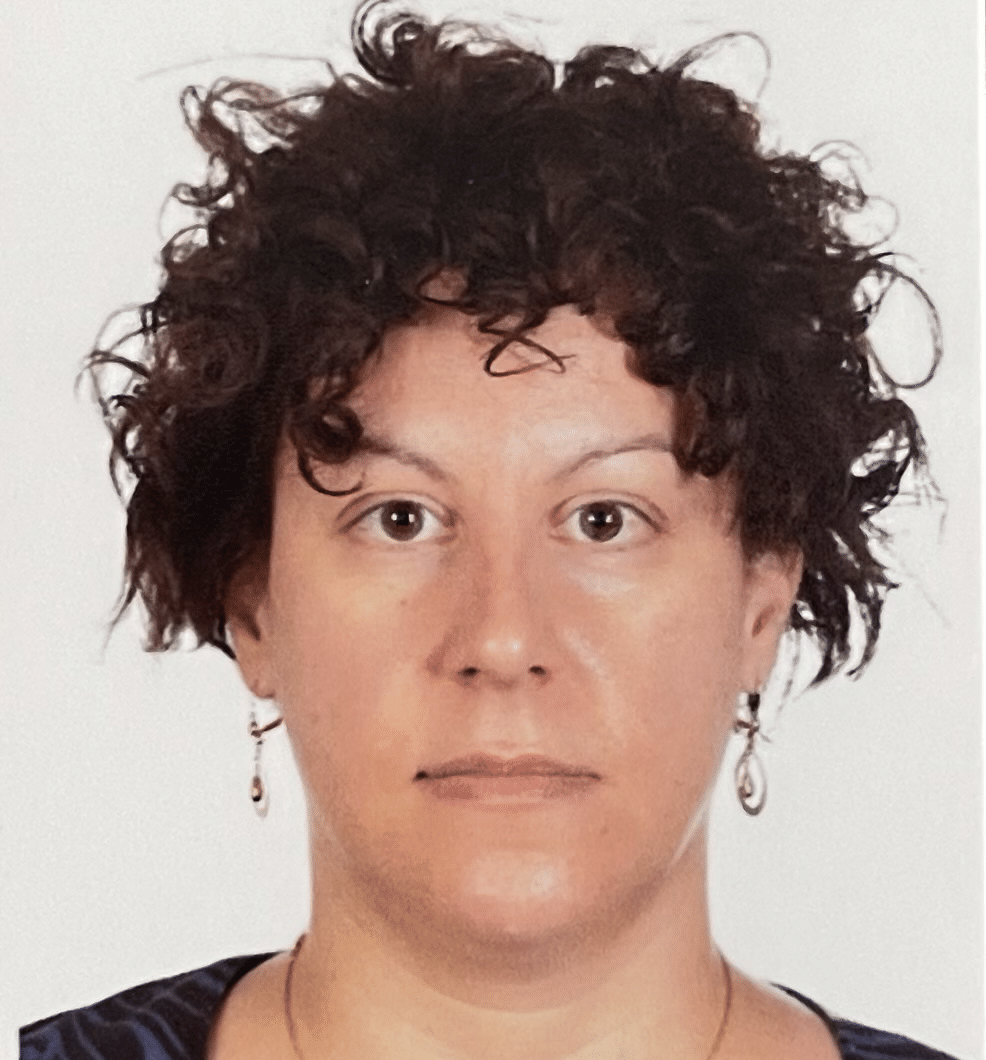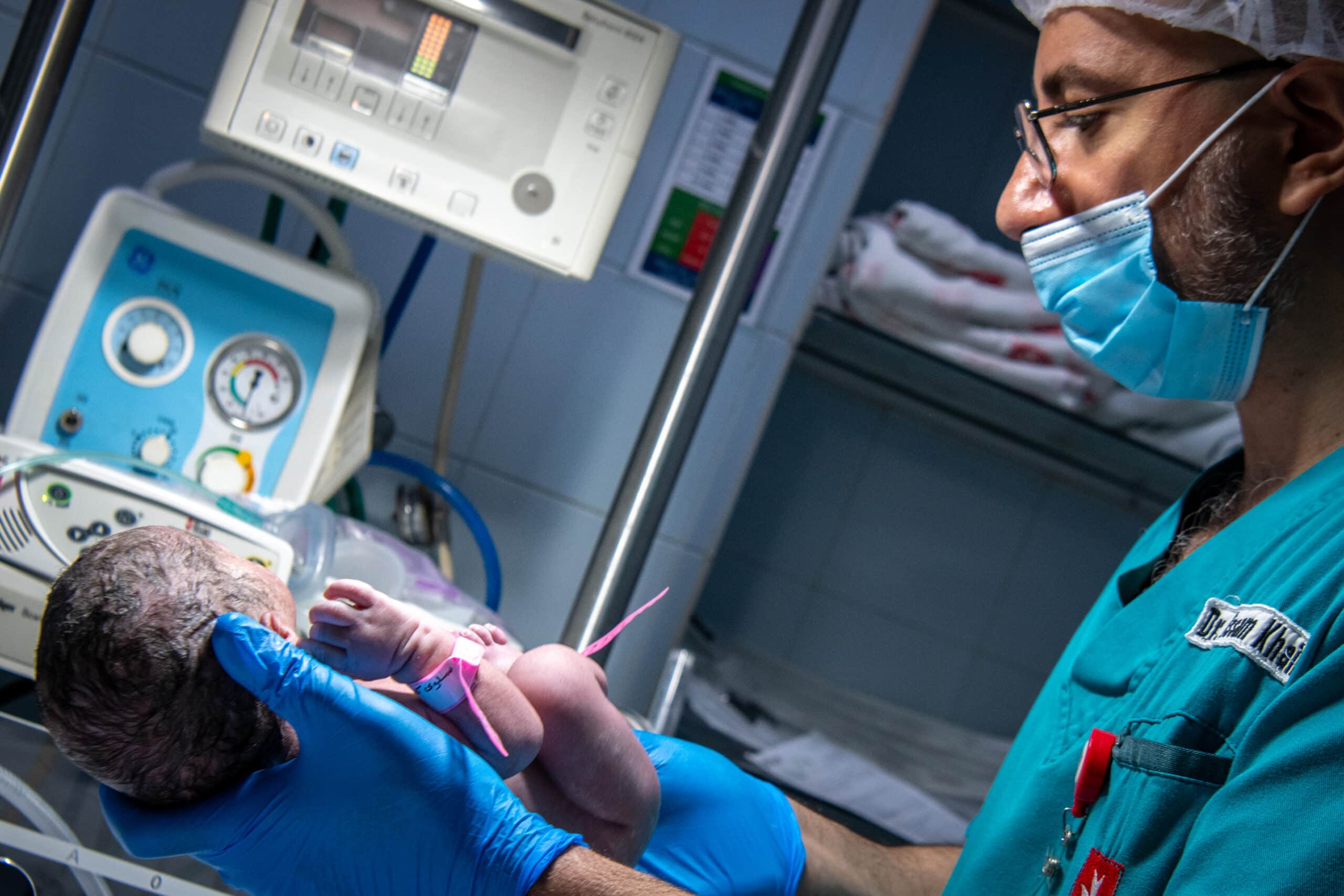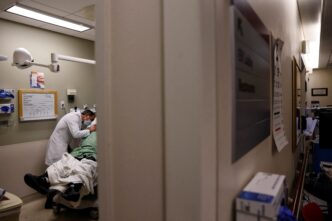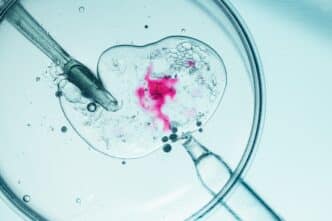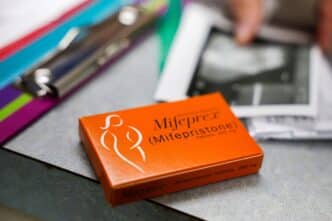In Bethlehem, children continue to be born, unfazed by the war that has raged in Gaza for over a year and whose impact is felt in the West Bank of Palestine through a surge in unemployment, economic crisis and violence.
As a journalist based in Jerusalem, I was privileged to witness this miracle at Holy Family Hospital, located just 1,500 steps from the Church of the Nativity, the birthplace of Jesus.
The hospital building stands at the border between Bethlehem and Beit Jala, a Palestinian Christian town in the West Bank, amid the traffic of cars and the chatter of the nearby market, which stretches from here toward Bethlehem’s old city. Through the hospital’s doors, lives and stories enter, and new lives, new stories emerge.
During visiting hours, the hospital corridors and postpartum rooms fill up with sweets and colorful balloons.

On Sept. 9, Hazar Barham, a young Christian mother, gave birth to her second child. She became pregnant last December, when the war had already been going on for over two months, and Bethlehem was preparing for a Christmas without lights.
“During these months of pregnancy, I tried to live day by day, hoping the situation would improve and peace would return,” she told me just hours after giving birth to Marcel. Since then, not much has changed. But there is a small new light for this family. “This baby is a gift from God,” Hazar said. “I had some difficulties during childbirth, but the moment I held him in my arms, I felt relieved. I thank God for this blessing.”
‘Giving joy to the people’
Every year, an average of around 4,500 babies are born at the Holy Family Hospital. Since it reopened as a maternity hospital in 1990, “half of the population of the Bethlehem governorate has been born here,” Gilles Normand, who has been the CEO of the facility for nearly three years, told me with pride.
A Frenchman with a military background in the French Foreign Legion, Normand is also a member of the Sovereign Military Order of Malta, which runs Holy Family Hospital and appointed him as CEO in February 2022.
His office door is always open. The traits of military life are evident in his bearing and in the simplicity that surrounds him, along with those of a man who, for a long time, has made his life a gift to others — first, as the director of the Institution des Invalides de la Légion Étrangère, a residence for former soldiers who have nowhere else to go, and then as a member of the Order of Malta.

“To be the CEO of the Holy Family Hospital is a gift I would have never expected. Every delivery, every birth here in the hospital, is also a gift, both for the families and for the hospital. We know that we are giving joy to the people. Really, it’s a gift to participate in giving birth here, especially being in Bethlehem.”
Our Lord in need
The hospital opened in 1888 as a general hospital run by the Daughters of Charity of St. Vincent de Paul. In 1985, management was handed over to the French section of the Order of Malta, which has a long tradition of projects in maternity care. That’s why, following renovations, the hospital was converted into a maternity hospital. On Feb. 26, 1990, the first baby was born in the new maternity ward.
The Daughters of Charity remain the owners and are part of the board. Additionally, they are involved in the hospital’s operations, specifically in the meal and laundry services.
In premises adjacent to the hospital, though separate, they also run an orphanage with a meaningful name: La Crèche, the Nativity. For over 140 years, they have welcomed abandoned children from all over Palestine, providing them with everything they need. The children arrive at La Crèche in coordination with social services. There are usually about 50 children up to the age of 6, but currently there are around 30, as the war has made it difficult for them to arrive from the more distant areas of Palestine.
At the end of a long corridor filled with toys, the children gathered excitedly around Sister Denise Abi Haider. Along with her, two other nuns and 45 workers care for the children 24 hours a day. “For us, every child that arrives is like welcoming Jesus,” Sister Denise told me. “Jesus teaches us to love everyone, without looking at their origin or religion, but by recognizing the value of each person. We are here as a gift to them, and we try to give them everything they need, especially love.”
During the day, the children of hospital employees and some underprivileged families from Bethlehem are also welcomed at the kindergarten, where they all play together. It’s a way to foster connections between children from different communities and help the youngest develop social and emotional skills.
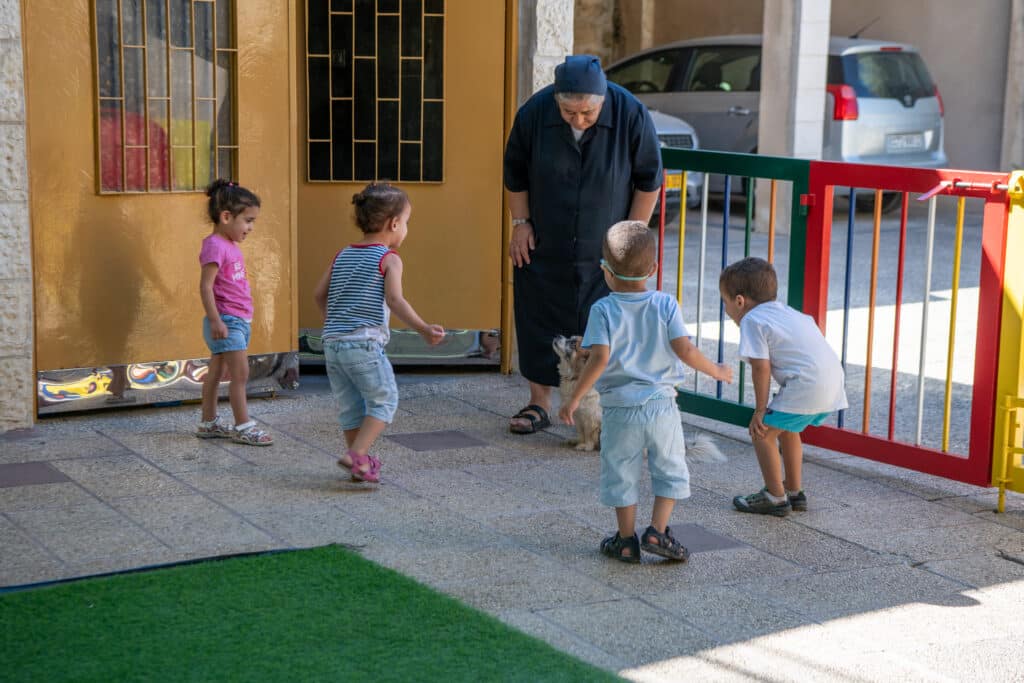
Sister Denise Abi Haider of the Daughters of Charity of St. Vincent de Paul plays with children at La Crèche orphanage in Bethlehem. (Courtesy photo)
Sister Denise grew up in a Christian family, where she learned to care for her relatives and those close to her. “I wanted to give more, which is why I decided to enter religious life — to give everything I could to as many people as possible. When you give, you are happier than when you receive. That’s exactly what our mission is about.”
The symbiosis between Holy Family Hospital and La Crèche is supported and nurtured by the same sense of mission. “St. Vincent de Paul spoke of ‘our Lord the poor,’ while the Order of Malta speaks of ‘our Lord the sick.’ It’s almost the same. We are providing the best care possible to those in need,” Normand explained to OSV.
A Christian work of charity
Founded in Jerusalem in the 11th century, the Order of Malta is now active in 120 countries, caring for people in need through its medical, social and humanitarian works in accordance with its mission of preserving human dignity and assisting all, regardless of their ethnic origin or religion.
The Holy Family Hospital is no exception. Here, about half of the 200 staff members are Muslim, as are the vast majority of patients (the Christian population is less than 1% in the region). “This is a Catholic hospital, and we ask all staff and patients to follow our rules,” Normand said. For example, abortions and in vitro fertilization (IVF) are not performed here.
Dr. Bashar Rishmawi is the chief resident of the obstetrics and gynecology (OB-GYN) program at the Holy Family Hospital and a Christian from the Bethlehem region. He told me that he feels a strong connection to his city. “Working near the Nativity Church is something special, and caring for deliveries here is also special because we are in the birthplace of Jesus,” he said.
“I think this place reflects the essence of Christianity: to help others, to love others, despite their religion, our differences and our beliefs. In the hospital, treating everyone with the same respect, love and care represents us as Christians. These are our values, and this is what we strive to offer to all people.”
The ravages of war
Since Oct. 7, 2023, when the war broke out between Hamas and Israel, many aspects of the hospital’s routine have changed. “My role has shifted more toward managing risks and crises,” Normand recounted. “I had to secure the hospital while continuing to deliver the same quality of care as before. From October to February, I had to cancel the outreach clinic schedule because it was too dangerous to travel. Some staff members live outside Bethlehem; until the end of April, I accommodated them in Bethlehem, and we switched from three shifts to two to avoid people driving at night.”
Despite the situation, “women are continuing to get pregnant as before. In my opinion, this is a signal that they are confident in the future,” Normand reflected. “However, we have seen a decrease in deliveries due to the financial crisis.” The forecasts predict between 3,600 and 4,000 births, down from the over 4,500 seen in recent years.
“Since the beginning of the crisis, everyone has been telling us, ‘We don’t have money,’ ‘We don’t have any jobs.’ We try to maintain sustainable fees for the hospital that are as affordable as possible for the families. We were able to offer discounts for consultations, but we cannot make all care free. I have to pay my employees, taxes, suppliers and so on.”

For a normal delivery, the fee is around 1,200 Israeli shekels (about $320), “which is not a lot, but now it’s an amount,” especially considering that in a government hospital they pay no more than 5 shekels ($1). “We have a list of patients who come for consultations here, then deliver elsewhere, particularly at a government hospital.”
Dr. Rishmawi shared how he was personally affected by the war. He spent one year in France as part of his residency and was there on Oct. 7, 2023, when the war broke out. “I returned on Oct. 30. As the months passed, the population in the West Bank began facing economic challenges. Many people have lost their jobs. We’ve noticed a slight decrease in the rate of deliveries because people prefer to go to more affordable hospitals.”
He’s 33 and got married on May 30, 2023. “I’m grateful that despite everything, we were able to arrange a wedding — life has to go on,” he said. However, the instability of the situation makes him hesitant to have a child. “Sometimes, during periods of great loss, life is the greatest gift. It gives people hope and something to focus on. Even though I’m working 24 hours in the obstetrics department, my wife and I are considering postponing having children. We don’t know where the West Bank is heading. We’re uncertain about the economic situation in Bethlehem and whether a war might start here.”
The sacredness and vulnerability of life
The neonatal intensive care unit (NICU) is a flagship of this hospital, the only one in all the Palestinian Territories capable of caring for infants born before 32 weeks. The unit can accommodate up to 18 babies at a time, and each year, approximately 500 infants are admitted here (10% of those born at the Holy Family Hospital).
Ishraf Farraj, 54, is the NICU supervisor. “I have always had a passion for healthcare and working with children, which led me to pursue a career in nursing and to specialize in neonatal care,” she told me as we stood in the NICU on the top floor of the building. She wanted me to know that working in the NICU involves facing the reality of children’s suffering and the pain of their families. Choosing to work in this department is not common, but Ishraf understood right away that this was her calling.
“To me, dealing with this suffering means being present and providing comfort. I see it as an opportunity to show empathy, offer support, and be a source of strength for families during one of the toughest times of their lives,” Ishraf shared. “It’s both heartbreaking and overwhelming to see children who have just entered the world already facing so much suffering. It reminds me of the vulnerability of life and how precious each moment is. Working here has made me more aware of the sacredness of life and the importance of every child.”

I heard many stories, like those hinted at by each of the photos displayed on the department’s bulletin board. Ishraf told me one about triplets born at 23 weeks. “In another hospital, they would have been aborted,” she recounted. “We were asked to work with these babies; we did, and all three went home with their parents. After that, I realized that it doesn’t matter if a baby is 23 weeks or 25 weeks, small or underweight. With proper treatment and expertise, a baby can survive.”
Since the start of the war on Oct. 7, 2023, “there have been significant changes in our community that have deeply affected everyone, including the families we care for in the NICU,” Ishraf said. “Many families are facing additional fears, not just about their newborn’s health, but also about safety and the future.”
Some mothers can’t always reach the hospital to visit their babies due to checkpoints and road closures. Ishraf herself lives in a refugee camp near Bethlehem, and sometimes, when there are Israeli operations, she’s unable to reach her workplace. “They call asking about their babies. Some cry on the phone. They need extra emotional support to feel secure during this uncertain time. I’ve found myself spending more time listening and offering comfort and understanding what the families are going through.”
A ‘sense of fulfillment and purpose’
The medical and nursing staff are aware of their privileged position at a time when the unemployment rate has skyrocketed. According to the latest available World Bank report published in September 2024, based on the data of the Palestinian Center Bureau of Statistics, “in the West Bank, the unemployment rate is estimated at 35 percent” in the 1st quarter of 2024. Furthermore, “due to the job losses and shortened work hours, 87.2 percent of workers in the West Bank saw their household incomes shrink since the conflict’s onset.”
Each staff member strives to meet the needs of the young patients and their families with professionalism, but also with humanity and dedication.
Hanan Daoud is a nurse who has been working in the emergency room for 31 years. “It was during the first Intifada, and I was just finishing my secondary school. We witnessed shootings and people in need of help. That’s when I decided to become a nurse,” she told me. “I wanted to help people when they needed it.”
She takes care of surgeries and emergency cases. “I love helping babies be born. All our work is about giving life and providing support to the babies and their mothers,” she said.
Hanan also received a gift from the Holy Family Hospital. “All my children were born here. Furthermore, working at the hospital has helped me build my life. It allowed me to build my home, raise my children, and ensure they all studied at university. That’s a gift from God.”
As we talked, she sat beside her daughter Aseel, 24, who has been working at the Holy Family Hospital for a year as a midwife. Growing up with her mother’s stories, Aseel often waited for her, playing with her brothers in the garden of the Holy Family Hospital, which has become a familiar place for her.
“I love to help and take care of the babies. I cherish the moment of showering them for the first time,” she said with a smile. “When I chose to be a midwife, I knew that all my work would be about giving myself and providing support. I dedicate all my efforts to ensure the mother and baby are in the best possible situation. The true gift is about giving life: taking life from another and getting a (person) with another soul.”
As Dr. Rishmawi told me, “The emergency, the rush, the ability to save lives each day — it’s something unbelievable. Going home after a shift, knowing you’ve made a visible impact, is very relieving; it brings a lot of peace in my heart,” he added. “I work in this department with a strong sense of responsibility, along with a deep appreciation, and it reflects a significant amount of happiness in my life.”
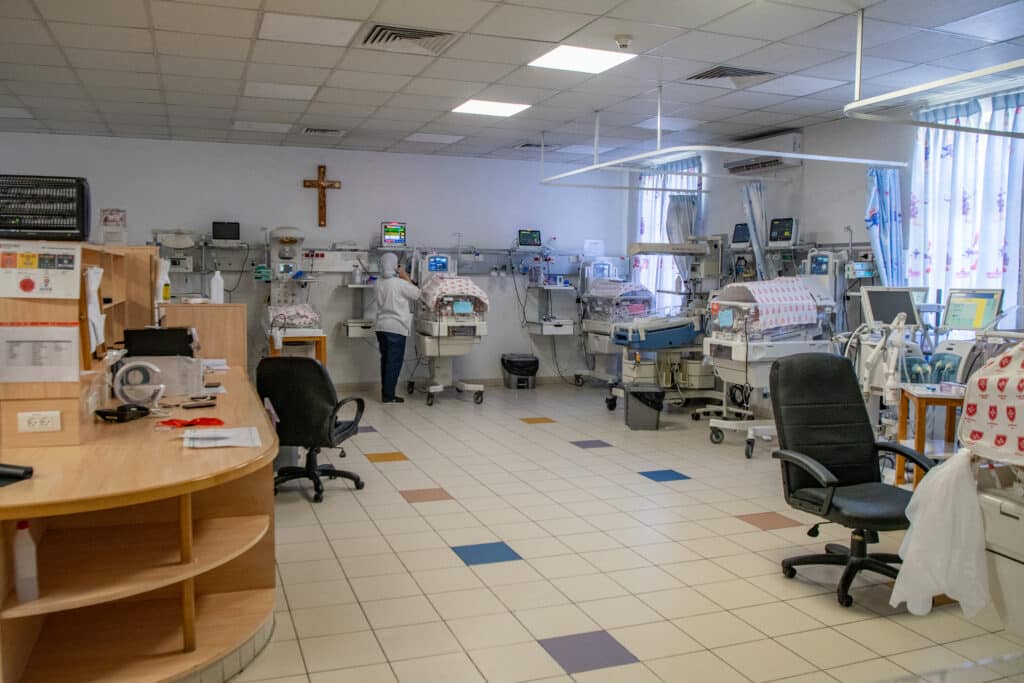
“Working in the NICU has taught me flexibility and patience. I’ve gained greater emotional maturity and learned the importance of teamwork. Most importantly, my work in the NICU has given me a deep appreciation for life and a sense of purpose,” Ishraf Farraj shared.
“I believe my work is a balance between giving and receiving,” she reflected. “On the surface, it may seem mostly about giving — providing care, time, energy and emotional support to the infants and their families. But I receive so much in return. I gain a profound sense of fulfillment and purpose. I learn resilience from the babies fighting for their lives, and I receive gratitude, strength and trust from the families I work with. There’s a deep emotional and sometimes spiritual reward in witnessing the courage of these newborns and the love their families have for them. It reminds me daily of the value of life and the impact that kindness and care can have.”
The city where Jesus was born
When he was in the French Foreign Legion, Gilles Normand used to spend every Christmas night with his soldiers. Since he has moved to Bethlehem, he said: “My wife and I have been attending the holy Mass on Christmas night. After midnight, I visit the hospital to see who is born on the holy night, especially those closest to midnight. Then, on Christmas Day, I return to the hospital and we offer a gift to every newborn — typically clothes for the baby. This year, I’ll do the same.”
“I hope this war comes to an end as soon as possible, so that life can continue and Christmas can be properly celebrated in the birthplace of Jesus,” resident Bashar Rishmawi said. “Christmas won’t be Christmas without the celebrations, the family gatherings, the festivals and the joy of people — especially the joy of children — in Bethlehem, where Jesus was born.”

Christmas in Bethlehem is always a special time, eagerly anticipated by everyone. Ishraf Farraj is a Muslim, but she feels “a special privilege to care for these fragile new lives in a place that holds such deep meaning for so many people around the world. Working with newborns in the city where Jesus was born adds a profound spiritual dimension to my work.”
The birth of a child, she added, “is always a profound and miraculous event, even when accompanied by suffering. At its core, every human life is a gift,” she emphasized. “I have seen families who, even in the face of hardship, find immense love and meaning in the birth of their child. For them, the child represents hope and a new chapter, even when it brings many challenges. As a caregiver, my role is to support these families and honor the gift of each new life, no matter how fragile it may be.”
Fragile, I thought, just like Jesus’ life when he was born in this very city.
